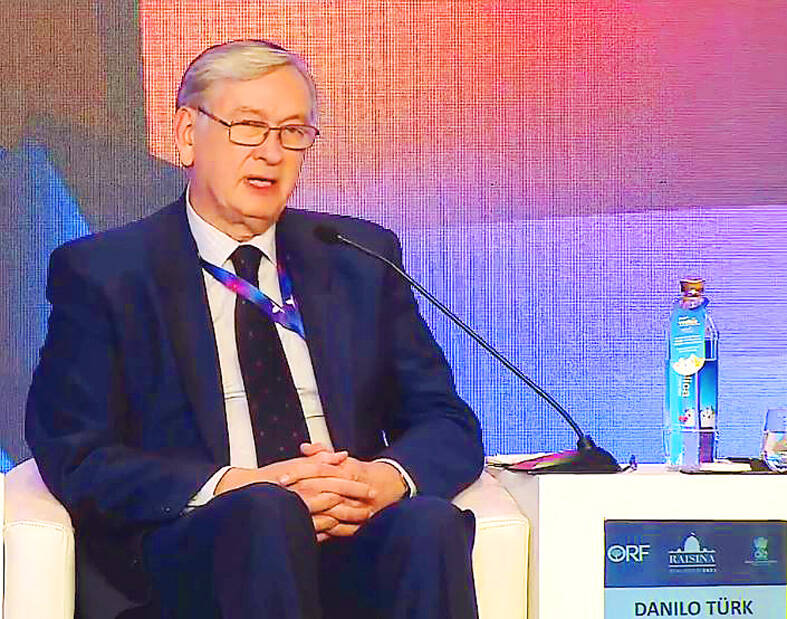An armed conflict across the Taiwan Strait is not inevitable, former Slovenian president Danilo Turk told the Raisina Dialogue conference in New Delhi.
The annual conference, which was held over three days and ended on Saturday, was organized by the Indian Ministry of External Affairs and New Delhi-based Observer Research Foundation think tank.
During a session on Saturday titled “The Strategic Poser: Dragon’s Manoeuvre in the Taiwan Strait,” six panelists discussed the possibility of China launching a military campaign against Taiwan and its timetable for doing so.

Photo: Screen grab from Raisina Dialogue conference livestream
Turk called on the global community to explore a path to a peaceful resolution of cross-strait tensions and avoid looking for solutions through military strategizing.
The global effects of a Chinese invasion “would be profound,” as a substantial part of global foreign trade would be halted, former Swedish prime minister Carl Bildt said.
China would not conduct an invasion “without very, very thoughtful preparations,” given the consequences to China and the world at large, Bildt said.
German lawmaker Peter Beyer said that the world should not speculate about the timetable of a possible Chinese invasion, but should be prepared as China “is very concretely preparing for a military invasion of Taiwan,” adding that an invasion could be possible “within the next two to five years.”
Germany sent a brigade to the South China Sea “to show solidarity with Taiwan” and like-minded countries in the region in response to China’s increased military presence, Beyer said.
He called on Germany to continue its solidarity with Taiwan by having the country’s lawmakers and business representatives frequently visit Taiwan.
Former Indian ambassador to Japan Sujan Chinoy cited Chinese President Xi Jinping’s (習近平) “Chinese Dream” and the two centenary goals Beijing proposed in 2017 as indications that China would attempt unification with Taiwan by 2049, the 100th anniversary of the People’s Republic of China.
However, Chinoy voiced doubts about an invasion of Taiwan, as it would be “likely to derail China’s own economic trajectory” and result in international sanctions.
An economic embargo or blockade would be one tactic China could use in preparation for or in conjunction with air and naval attacks, Chinoy said.
The US, Japan and Australia are certain to become involved in such a scenario, he added.
If Taiwan were to declare independence, “that would be a clear red line” for China, Shangri-La Dialogue senior fellow for Asia-Pacific Security Lynn Kuok said.
The ambiguity of China’s “Anti-Secession” Law, enacted in 2005, provides flexibility for Beijing to determine the circumstances in which it could justify an invasion of Taiwan, she said.

Nipah virus infection is to be officially listed as a category 5 notifiable infectious disease in Taiwan in March, while clinical treatment guidelines are being formulated, the Centers for Disease Control (CDC) said yesterday. With Nipah infections being reported in other countries and considering its relatively high fatality rate, the centers on Jan. 16 announced that it would be listed as a notifiable infectious disease to bolster the nation’s systematic early warning system and increase public awareness, the CDC said. Bangladesh reported four fatal cases last year in separate districts, with three linked to raw date palm sap consumption, CDC Epidemic Intelligence

Two Taiwanese prosecutors were questioned by Chinese security personnel at their hotel during a trip to China’s Henan Province this month, the Mainland Affairs Council (MAC) said yesterday. The officers had personal information on the prosecutors, including “when they were assigned to their posts, their work locations and job titles,” MAC Deputy Minister and spokesman Liang Wen-chieh (梁文傑) said. On top of asking about their agencies and positions, the officers also questioned the prosecutors about the Cross-Strait Joint Crime-Fighting and Judicial Mutual Assistance Agreement, a pact that serves as the framework for Taiwan-China cooperation on combating crime and providing judicial assistance, Liang

The manufacture of the remaining 28 M1A2T Abrams tanks Taiwan purchased from the US has recently been completed, and they are expected to be delivered within the next one to two months, a source said yesterday. The Ministry of National Defense is arranging cargo ships to transport the tanks to Taiwan as soon as possible, said the source, who is familiar with the matter. The estimated arrival time ranges from late this month to early next month, the source said. The 28 Abrams tanks make up the third and final batch of a total of 108 tanks, valued at about NT$40.5 billion

Reports of Taiwanese going missing, being detained or interrogated, or having their personal liberties restricted in China increased about fourfold annually last year, the Mainland Affairs Council (MAC) said yesterday. Last year, 221 Taiwanese who traveled to China were reported missing, were detained and interrogated, or otherwise had their personal freedom restricted, up from 55 the previous year, the council said. Reopening group tours to China would be risky, as it would leave travelers with no way to seek help through official channels after Beijing shut down dialogue between the associations tasked with handling cross-strait tourism, the MAC said. Taipei’s Taiwan Strait Tourism